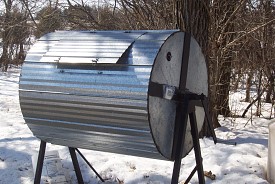Straight Talk on Meat and Dairy in the Compost
 Compost: in many ways, it's totally magical. You dump food waste, lawn clippings, paper, and other things into your compost pile; care for it; and wait for the pile to generate rich, dark, nutrient-laden soil that your garden will love. But there are a lot of questions surrounding compost, what you can put in it, and what you shouldn't toss in the compost bin.
Compost: in many ways, it's totally magical. You dump food waste, lawn clippings, paper, and other things into your compost pile; care for it; and wait for the pile to generate rich, dark, nutrient-laden soil that your garden will love. But there are a lot of questions surrounding compost, what you can put in it, and what you shouldn't toss in the compost bin.
Are Animal Products OK to Compost?
One of the most common questions about compost care is whether it's okay to add animal products like meat, dairy, and bones -- most people know eggshells and seafood shells can be great for compost (if you didn't know, they enrich the soil immensely and deter slugs and snails), but what about sour cream? Chicken bones?
Some people say you should absolutely never put animal products in the compost, ever. Others say it's totally fine, and in fact good for the soil; after all, in nature, animals decay right along with everything else. Others suggest getting around the problem entirely by going vegan.
So, what's the deal? Can you or can't you?
The short answer is: yes, you can. The longer version of that answer starts with a but...
Issues with Meat and Dairy in Your Compost
Here's why many people suggest not putting meat in your compost: It can attract pests. Rats, flies, dogs, and other visitors may come and rifle through your compost, making a big stinky mess. There are also some concerns about pathogens and whether compost piles get hot enough to kill them off. This isn't a big problem if you're growing ornamentals, but could be one if you're applying compost to food plants. (Yet another reason to wash fruits and veggies before consumption.)
Another potential issue is that meat and dairy tend to decompose anaerobically, which doesn't result in great compost, takes longer, and smells bad. The solution? Aerate your compost. Make sure to turn it regularly, and add substances like straw, paper, or sawdust to maintain aeration in the compost pile, encouraging even breakdown and the flourishing of microorganisms that rely on air to survive. High carbon additions (sometimes called browns) are important for balance in your compost anyway!
Manage the Compost Pile
Animal products aren't harmful to compost, but they do require more careful management. You'll need to commit to a well-enclosed composting area (you may want to hire a carpenter to build an enclosure or elevated compost platform) to ensure that pests can't get to it, and you will need to aerate regularly in addition to adding plenty of browns to maintain a healthy balance. Worms can help your compost break down even more quickly, which will cut down on odor.
Bokashi Composting
If you're worried about smell and pests, consider Bokashi composting. This intensive method of composting, developed in Japan, uses specialized microorganisms to quickly break down all food waste, including animal products, into compost. It's low-odor enough to be kept indoors, and the process of fermentation works so quickly that once a compost bucket is full, the contents will be totally broken down in a week to ten days!
You can add soil from a Bokashi composting setup to a regular compost bin or put it directly in the garden. Either way, your animal products will be well processed before heading outdoors, and they'll add rich nutrients to the soil so your landscaping service will have beautiful soil conditions to work with.
Katie Marks writes for Networx.com.
Updated July 30, 2018.
Looking for a Pro? Call us (866) 441-6648

Landscaping Average Costs
Landscapers Experiences

Concrete Patio Is The Finishing Touch For An Artist's Studio

Contracted A Large Tree Trimming Job For A Reasonable Price



